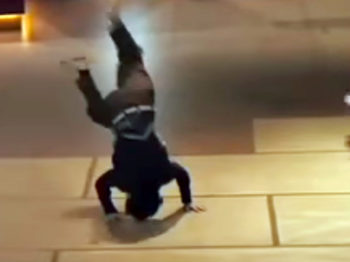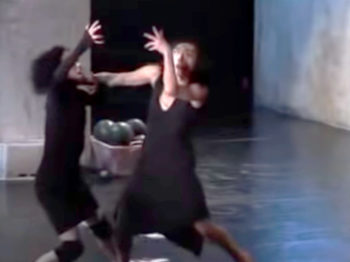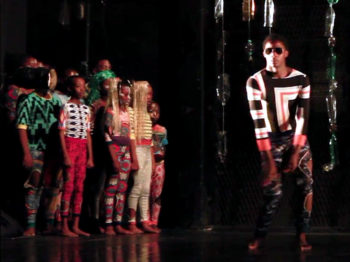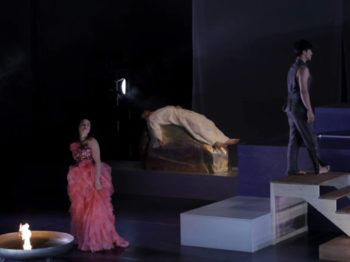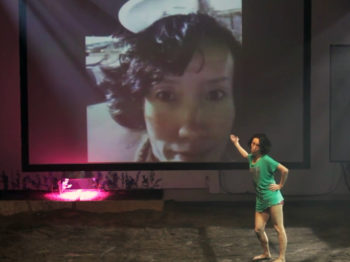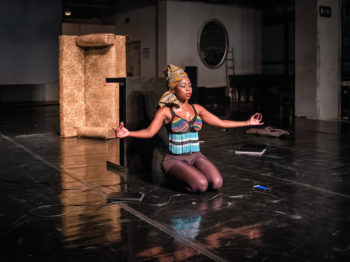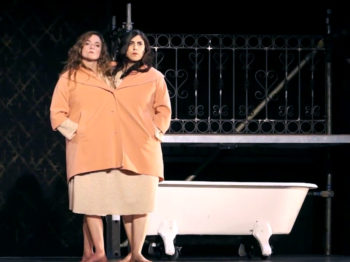Constanza Macras
2019-20 MIT Performing Series
Building dance theater from the ground up
About the Residency
Award-winning dance theater choreographer Constanza Macras came to MIT to collaborate with Kurt Fendt, Senior Lecturer in Comparative Media Studies/Writing and Director of the MIT HyperStudio, and other faculty members and students in Music and Theater Arts. Drawing on her background in documentary, community, and biography-driven performance work, Macras partners with MIT faculty and students and the greater Cambridge community to develop a new dance theater piece.
Through a highly collaborative creative process, Macras’s work foregrounds the voices and experiences of the community members who contribute to the project as co-creators and performers. Themes in her previous community-based performances include urban planning, globalization, migration, and xenophobia in communities in South Africa and Germany. After a period of intensive development at MIT Building W97, Macras’s residency culminated in a work-in-progress showing of a new collaborative piece.
The 2019–20 residency at MIT also included workshops with students in Fendt’s classes on the Digital Humanities, Expanding the Museum, and Designing Art Archives, as well as classes in Music and Theater Arts focusing on dance, choreography, and improvisation.
Macras’s work-in-progress showing was part of the MIT Performing series, a prototyping and presenting series programmed by Jay Scheib, professor for Music and Theater Arts, and presented by the MIT Center for Art, Science & Technology. The series is supported in part by the Council for the Arts at MIT. MIT Performing promotes a research-based artistic practice and serves as a new platform for contemporary performance.
This artist residency is supported by the Ida Ely Rubin Artists in Residence Fund.
Schedule
Past Events
Thinking Choreographically: A Talk with Constanza Macras
Thursday, October 31, 2019 / 7:00pm
MIT Theater Building, W97
345 Vassar Street, Cambridge, MA
Award-winning dance theater choreographer Constanza Macras discussed her background in documentary, community, and biography-driven performance work.
Class Visits
Comparative Media Studies/Writing, Global Studies and Languages, and Music and Theater Arts
Fall 2019
Collaborators at MIT
Kurt Fendt, Senior Lecturer in Comparative Media Studies/Writing (CMS/W)
Jay Scheib, Class of 1949 Professor of Music and Theater Arts and curator of MIT Performing
Biography
Constanza Macras was born in Buenos Aires, Argentina, where she studied dance and fashion design at the University of Buenos Aires University (UBA). She continued her dance studies in Amsterdam and New York (Merce Cunningham Studio).
In 1995, Macras moved to Berlin and danced for various companies. In 1997, she founded her own company Tamagotchi Y2K. Between 1998 and 2000, Tamagotchi Y2K presented four pieces: Wild Switzerland (1998), Face One (1999), In Between (2000), and Dolce Vita (2000), a site-specific live music performance that combined artists from various disciplines. It was created as a one-time event for each specific location.
From 2001 to 2002, Macras developed and presented the trilogy MIR: A Love Story. In 2002, she also curated the project ‘PORNOsotros.’ Together with Lisi Estarás (ballet c de la b), she performed four short pieces (with four different directors) dealing with the subject of pornography at Schaubühne am Lehniner Platz, Berlin.Constanza Macras was born in Buenos Aires, Argentina, where she studied dance and fashion design at the Buenos Aires University (UBA). She continued her dance studies in Amsterdam and New York (Merce Cunningham Studios).
Macras has taught workshops and master classes in Japan, the United States (Walker Art Center in Minneapolis, On the Boards in Seattle), France, Italy (Rome University for Performing Arts), Belgium (University of Antwerp), the Netherlands (Henny Jurriëns Studio), Switzerland, and Germany (Hochschule für Schauspielkunst Ernst Busch and Berlin University of the Arts, both in Berlin).
In 2008, Macras received the Goethe-Institut Prize for her piece Hell on Earth. In 2010, she was awarded the MIT William L. Abramowitz Residency. Since 1961, the series has brought renowned performing artists and writers to MIT to perform, present public lectures, and collaborate with students in free programs. In the same year, Constanza Macras was awarded the Der Faust, a national German theater prize for best choreography, for her piece Megalopolis.
In addition to her productions with her company, Macras has also created Bosque de Espejos (2016) for Teatro Colón’s Permanent Ballet Company in Buenos Aires; Soft Cell (2015), commissioned by and for the Göteborg Opera Dance Company; Paraíso sem Consolação (2008), a commission from the Goethe-Institut São Paulo with dancers from the company and a Brazilian cast; Ein Sommernachtstraum (2006) with Thomas Ostermeier, the Schaubühne ensemble, and dancers from DorkyPark, which premiered at the Hellenic Festival; Pegarle a la Bolsa (2004) a commission from the Goethe-Institut Córdoba (Argentina); and Happiness (2003) for the Saarländisches Staatstheater Ballet.
More at the artist’s website: Constanza Macras/Dorkypark
In the Media
“The Macras choreographies, which used to be more strongly influenced by synchronized group choreographies in over-the-top MTV style, are becoming increasingly complex and sophisticated. They not only energetically meet the madness nerve when the entire Dorkypark ensemble suddenly swirls across the stage collectively, but also convert the set themes recognizably into movement material.”
—Nachtkritik: Berlin Elsewhere—Dance of Insanity and Exclusion, April 2011
Art Here and Now: Back to the Present, October 2007
Goethe- Institut: Acrobatic Dancers and Dancing Acrobats
Narthaki: Interview, December 2004

